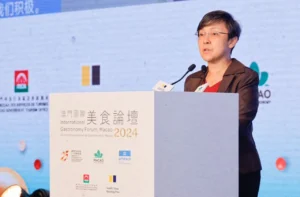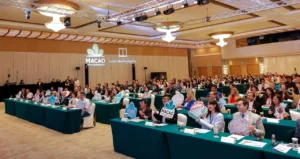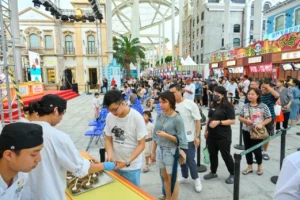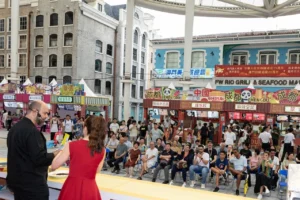Catering and leisure professionals discussed the importance of integrating health, culture, and environmental protection in the catering industry at the International Gastronomy Forum, Macao held on Monday. This event, organized at the Macau Fisherman’s Wharf, was part of the International Cities of Gastronomy Fest, Macao, and included collaborations with nearly 30 cities in the UNESCO Creative Cities Network.
The Forum, themed “Holistic Gastronomy: Eat well, live well” underlined the importance of an integrated and sustainable approach to gastronomy, emphasizing that the future of Macau’s tourism and culinary culture depends on conscious and innovative practices, at a time when the volume of tourists in the city is reaching high numbers again, and therefore having a greater environmental and social impact.
Maria Helena de Senna Fernandes, Director of the Macau Government Tourism Office (MGTO), revealed earlier this week that the city received around 14 million tourists in the first five months of this year, with a daily average of 93,000 visitors. A few days later, the Secretary for Economy and Finance pointed out that the Macau SAR should reach 33 million tourists in 2024.
In 2023, the amount of municipal solid waste discarded in Macau increased by 14.8 percent, with about one-third of the total composed of organic materials, according to the latest report from the Environmental Protection Bureau.

Maria Helena de Senna Fernandes, director of Macau Tourism Services (MGTO), revealed earlier this week that the city received around 14 million tourists in the first five months of the year.
An authentic gastronomic experience
Ruby O, Vice President of Sustainability & Business Synergy at MGM, spoke about the importance of diversifying Macau’s gastronomic offerings. “Tourists who come to Macau are less sensitive to the notion of well-being, but they want to know what’s good to eat. We need to diversify the offerings, with healthy and quality food,” she said.
The sustainability professional highlighted that the right approach is not to think about where tourists prefer to go, but where the residents go to eat and what makes those local restaurants or food stalls appealing. “The food, the people, and the history are what matters. Millennials and Generation Z want to know about this when they choose a restaurant. We know there is a market, but we have to work together to develop our advantages and take a holistic approach to Macau’s tourism,” she pointed out.
More information about International Cities of Gastronomy Fest, Macao
The MGM representative also considered that Hong Kong and Macau are in the same tourism value chain. “Many international tourists who land in Hong Kong also have this impulse to want to buy what is local, and many of them then travel to Macau. That’s why Hong Kong and Macau end up being in the same value chain,” she highlighted. “How do we convince tourists to eat more local food? It has to be from a safety and quality point of view, ensuring that the products have quality and selecting ingredients that people know where they came from,” concluded Ruby O.

Catering and leisure professionals discussed the importance of integrating health, culture, and environmental protection in the catering industry at the International Gastronomy Forum, Macao held on June 17.
Andrew Tsui, co-founder of Rooftop Republic, a Hong Kong company that promotes urban agriculture, highlighted the importance of using fresh and local ingredients to ensure an authentic and low-environmental-impact experience. “It doesn’t make sense to have packaged ingredients coming from the other side of the world. Ensuring that restaurants use 100 percent local ingredients would be a way to guarantee that quality, experience, and cut down on emissions caused by imports.”
May Chow, chef and owner of the Hong Kong restaurant Little Bao, explained that her restaurant is in a city “where 98 percent of the food is imported.” For this reason, she began to explore ways to promote local ingredients, ending up communicating the city’s culture through food.

There are 100 Asian gastronomic stalls set up on the International Gastronomy Promenade, another of the event’s attractions, showcasing typical delicacies from various countries and regions. The venue has around 700 seats available for meals, a games area and a bar area in the marina, as well as shows to enhance the festive atmosphere.
Mariana de Oliveira Dias, Executive Director of Health & Wellness at Sands China, spoke about the importance of educating customers about healthier and more sustainable food options. “Holistic gastronomy takes into account all the elements of the gastronomic, wellness and health experience, including a focus on the use of unprocessed foods.” The wellness professional emphasized the need to offer healthier food options, such as plant-based food, and how education about the environmental impact of food can influence healthier choices.

City of Gastronomy demonstrations, one of the three highlights of the “International Cities of Gastronomy Fest, Macao”, are being presented until June 23 at Macau’s Fishermen’s Wharf by guest chefs representing 26 UNESCO Creative Cities of Gastronomy from around the world, coming from Asia, Europe, Africa, Oceania, South America and North America.
“There are many ways to invite customers to choose healthier options, by explaining how the food is produced, what its environmental impact is, how it was packaged, etc. Offering plant-based options and their benefits. These are simple things that are important, as they make sustainable options accessible to everyone,” she highlighted.
Maria Fátima Pun, Director of Sustainability at Wynn Palace and Wynn Macau, emphasized the use of technology to reduce food waste. “We need to measure the social and environmental impact of our activities. For example, we need to evaluate food waste, which is abundant in Macau, and that’s how we can use new technologies, such as artificial intelligence, to reduce this waste,” Pun explained.



